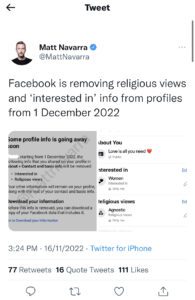Facebook will erase religious, political, and sexual preference information from user accounts. The transition begins on December 1.
Matt Navarra, a social media consultant, noticed the small but telling change. It shows that Facebook wants you to think about its platform in a different way now. In the early days of Facebook, people would fill out their profiles for hours on end. Things were different back then.
On Facebook, the information on your page is much more important than on newer social media sites, where a bio is usually just a few sentences and an occasional link.
Ten years of privacy problems have made giving out personal information less fun and carefree. Some people even put in fake information because they think it will trick the algorithms.

We’re getting rid of Interested In, Religious Views, Political Views, and Address because we want Facebook to be easier to use and navigate, said Emil Vazquez, a spokesperson for Meta. We’re sending notices to people who have filled out these fields to let them know that they’ll be taken away. This change does not affect anyone’s ability to share this information about themselves elsewhere on Facebook.

This change is part of Meta’s larger efforts to improve its public image. Overall, the tech industry wants people to know the difference between “sensitive” data and “regular” data. Meta will tell you that, for example, Instagram and Facebook don’t use sensitive data for advertising, but that’s because researchers found serious problems.
Read also: Kenyans Now Pay VAT For Facebook Ads
Why is Facebook erasing those from profiles?
After breaking the Housing Rights Act by allowing advertisers to use its systems to use those demographics to tailor housing ads, Facebook had to remove what it called “sensitive” ad targeting categories like race, region, and sexual orientation.
This amounted to discrimination against some viewers. In response, advertisers focused on proxies, such as targeting advertising based on interest in Jewish festivals rather than a person’s actual ethnicity. Since then, Facebook has eliminated hundreds of more categories used for the same reasons.
But there’s still a lot of data you can use, like location data or browser history, that could give you access to private information that the public shouldn’t see.
Recent research also found that Facebook uses people’s ages, races, and genders in commercials to show ads to people of different ages, races, and genders. For instance, ads portraying black individuals are less likely to be seen by white people.
Disputable Facebook revamps its platform
Facebook is also trying to clean up and simplify its platform, which has many features that are rarely used and interfaces that are hard to understand. Facebook has a bad name, not just because it causes problems in society but also because it’s no longer cool. Users have been leaving in droves, and even Instagram, Facebook’s younger and slightly cooler sibling, has seen its popularity drop.
Because of this, the company is in terrible financial shape. Just last week, it fired 11,000 people. Mark Zuckerberg, the CEO of Facebook, changed the company’s entire future. He moved away from social media and toward a “moonshot” goal of building “the metaverse,” which is a mix of virtual and augmented reality. But for now, Meta’s only way to make money is through Facebook and Instagram.
Even though WhatsApp is the most popular messaging service in the world, it hasn’t made much money for Facebook yet. Executives at the company are struggling as they try to stop the company from going downhill. They are trying to update the platforms and keep up with social media trends in a world without TikTok.
Reducing the number of ways in which your profile may be updated is, in a sense, an admission of defeat. The world has moved on, and Facebook has to evolve just as quickly as the rest of the world if it wants to continue to be relevant.
















